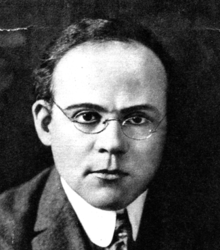 |
| Image Credit: Wikipedia.org |
Edgar Lee Masters (August 23, 1868 – March 5, 1950), an American poet, biographer, and dramatist is the author of Spoon River Anthology, The New Star Chamber and Other Essays, Songs and Satires, The Great Valley, The Serpent in the Wilderness An Obscure Tale, The Spleen, Mark Twain: A Portrait, Lincoln: The Man, and Illinois Poems. Masters published twelve plays, twenty-one books of poetry, six novels and six biographies, including those of Abraham Lincoln, Mark Twain, Vachel Lindsay, and Walt Whitman. Masters first published his early poems and essays under the pseudonym Dexter Wallace (after his mother's maiden name and his father's middle name) until the year 1903, when he joined the law firm of Clarence Darrow.
He was awarded the Mark Twain Silver Medal in 1936, the Poetry Society of America medal in 1941, the Academy of American Poets Fellowship in 1942, and the Shelly Memorial Award in 1944. He married twice. In 1898, he married Helen M. Jenkins and had three children. Two of his children followed him with literary careers. His daughter Marcia pursued poetry, while his son, Hilary Masters, became a novelist. Hilary and his half-brother Hardin wrote a memoir of their father. As we continue to celebrate National Poetry Month, we invite you to enjoy Silence, poetry by Edgar Lee Masters.
Silence
By Edgar Lee Masters
I have known the silence of the stars and of the sea,
And the silence of the city when it pauses,
And the silence of a man and a maid,
And the silence of the sick
When their eyes roam about the room.
And I ask: For the depths,
Of what use is language?
A beast of the field moans a few times
When death takes its young.
And we are voiceless in the presence of realities --
We cannot speak.
A curious boy asks an old soldier
Sitting in front of the grocery store,
"How did you lose your leg?"
And the old soldier is struck with silence,
Or his mind flies away
Because he cannot concentrate it on Gettysburg.
It comes back jocosely
And he says, "A bear bit it off."
And the boy wonders, while the old soldier
Dumbly, feebly lives over
The flashes of guns, the thunder of cannon,
The shrieks of the slain,
And himself lying on the ground,
And the hospital surgeons, the knives,
And the long days in bed.
But if he could describe it all
He would be an artist.
But if he were an artist there would be deeper wounds
Which he could not describe.
There is the silence of a great hatred,
And the silence of a great love,
And the silence of an embittered friendship.
There is the silence of a spiritual crisis,
Through which your soul, exquisitely tortured,
Comes with visions not to be uttered
Into a realm of higher life.
There is the silence of defeat.
There is the silence of those unjustly punished;
And the silence of the dying whose hand
Suddenly grips yours.
There is the silence between father and son,
When the father cannot explain his life,
Even though he be misunderstood for it.
There is the silence that comes between husband and wife.
There is the silence of those who have failed;
And the vast silence that covers
Broken nations and vanquished leaders.
There is the silence of Lincoln,
Thinking of the poverty of his youth.
And the silence of Napoleon
After Waterloo.
And the silence of Jeanne d'Arc
Saying amid the flames, "Blessed Jesus" --
Revealing in two words all sorrows, all hope.
And there is the silence of age,
Too full of wisdom for the tongue to utter it
In words intelligible to those who have not lived
The great range of life.
And there is the silence of the dead.
If we who are in life cannot speak
Of profound experiences,
Why do you marvel that the dead
Do not tell you of death?
Their silence shall be interpreted
As we approach them.
Comments
Post a Comment